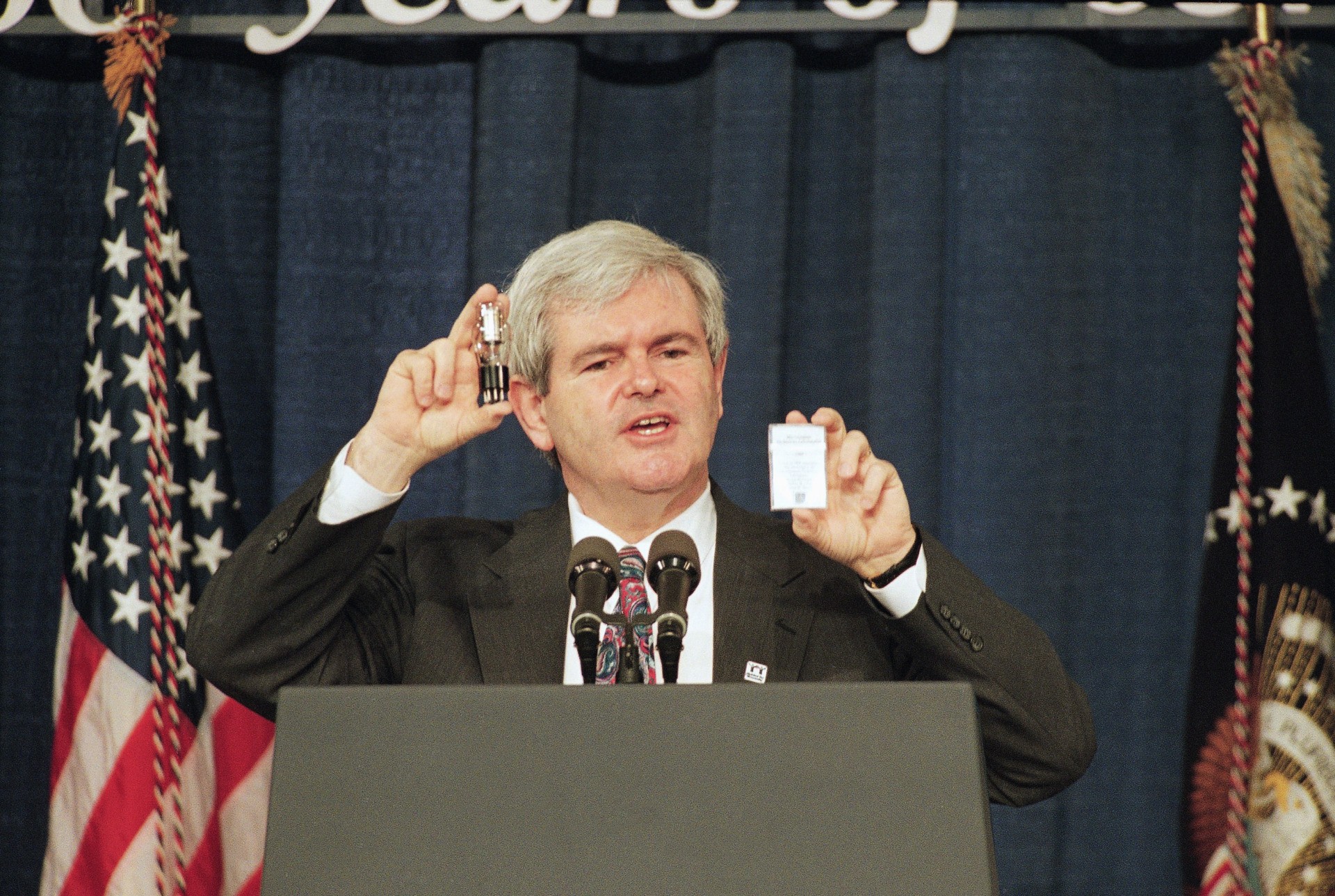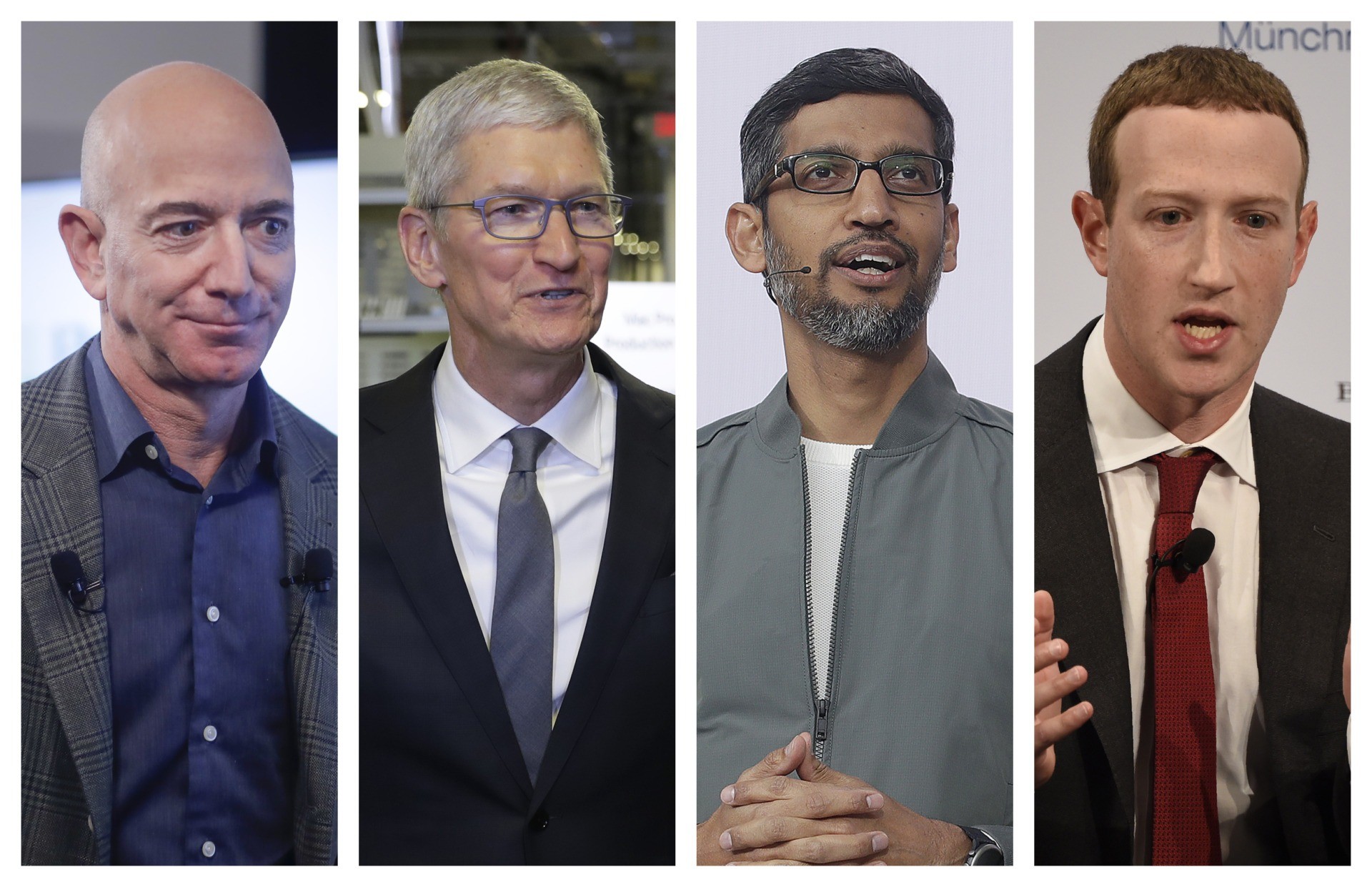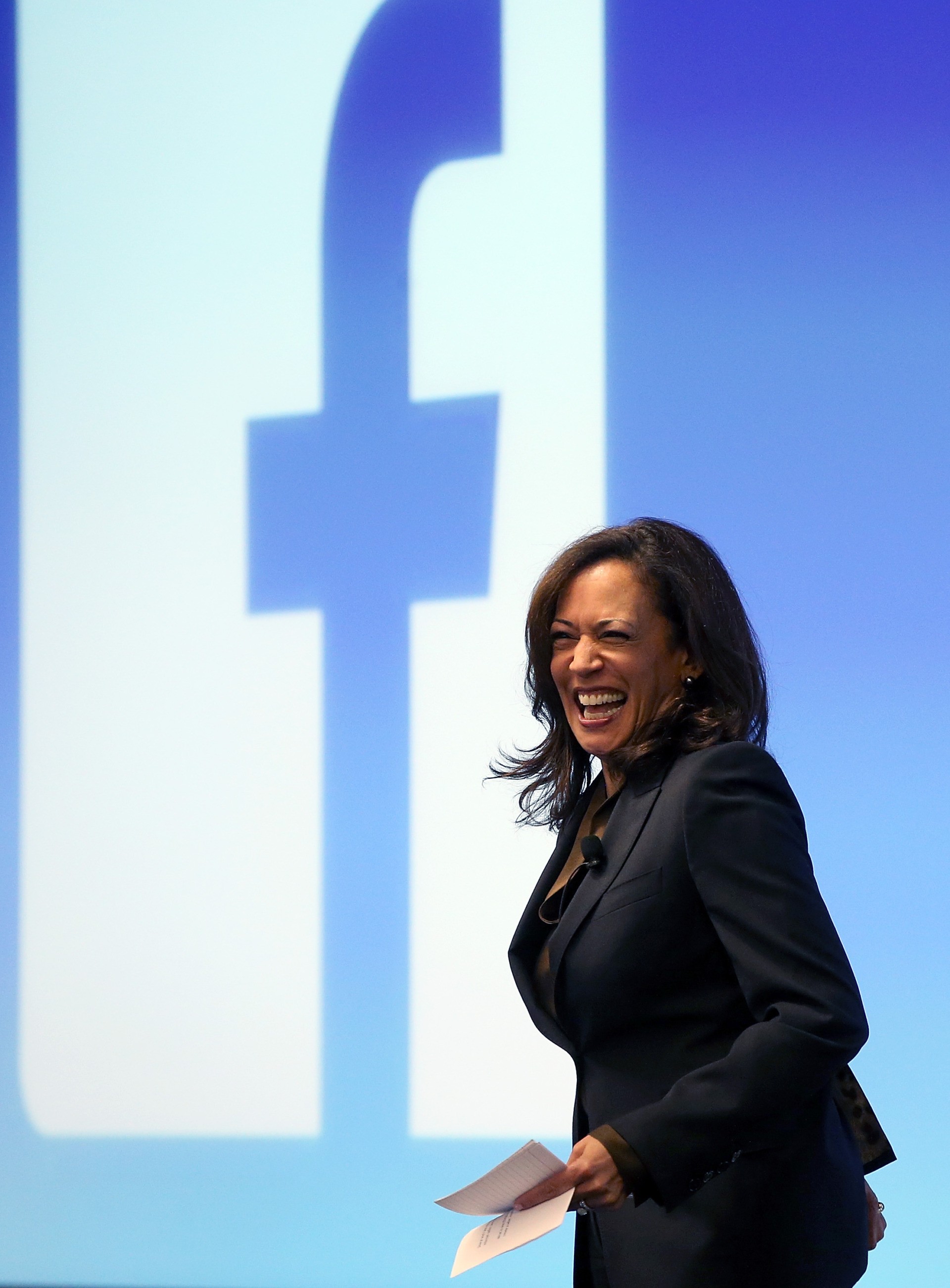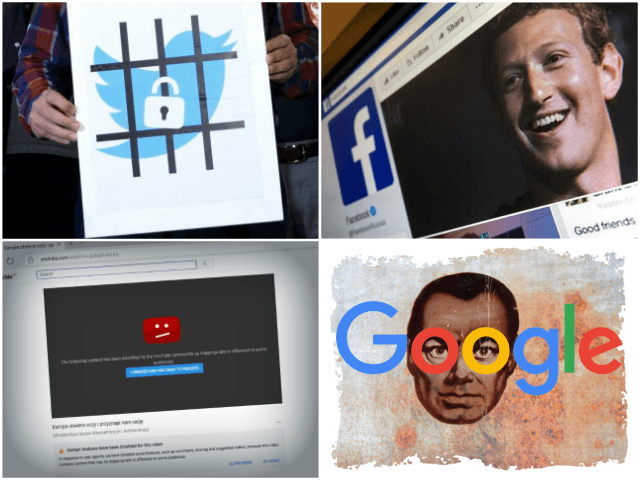The Old Right Fusionism
Here’s a data point deserving of attention: More Republicans than Democrats want to restrain or even break up Big Tech. According to a new poll by Vox and Data for Progress, 70 percent of Republicans think “Big Tech’s economic power is a problem facing the U.S. economy.” At the same time, 59 percent of Democrats feel that way.
This partisan split—Republicans tougher on Tech than Democrats—is further visible on the issue of remedies: 61 percent of Republicans want to “break up” Big Tech—that is, apply anti-trust laws—compared to 55 percent of Democrats.
The Republican grievance against Big Tech has been growing for the past two decades, and it represents a major change, as the GOP shifts from its once-instinctive support for free markets and corporate behavior (the latter not always the same as the free market, of course) toward a more skeptical, even critical, stance.
Back in the 1950s, the dominant strain on the right was “fusionism,” that is, the idea that the conservative movement and the Republican Party should be a “three-legged stool”: one leg being economic libertarians; another, foreign-policy hawks; and the third, social conservatives.
In the 1980s and ’90s, this fusionism made Republicans friendly to technology companies; leading GOP figures such as Ronald Reagan and Newt Gingrich extolled the wondrous future of corporate technology.
For instance, in his 1985 State of the Union address, President Reagan recalled, “In the late 1950s workers at the AT&T semiconductor plant in Pennsylvania produced five transistors a day for $7.50 apiece. They now produce over a million for less than a penny apiece.” He added cheerfully, “advances in technology are transforming our lives.”
A decade later, in 1995, Speaker of the House Gingrich appeared on national television, holding up a computer chip and declaring that technology would improve not only society, but also the federal government: “Our potential is as great and prosperous as it’s ever been in our history,” he said. “From now on, all roads lead forward.”

House Speaker Newt Gingrich, of Ga., holds a card from the Massachusetts Institute of Technology on a micro-miniaturization project, right, and vacuum tube from the Federal Aviation Administration while addressing the National Association of Counties, Tuesday, March 7, 1995 in Washington. Using the props, Gingrich spoke about modern and past technologies. (AP Photo/Doug Mills)
At the time, three or four decades ago, the vision that Reagan and Gingrich shared seemed perfectly plausible: that technology—then big, but not nearly as big as it is now—would both make our lives better and provide a superior alternative to Big Government. That is, Big Tech would become a counterweight to Big Government, perhaps even becoming a replacement for Big Government.
We might add that it was during this era that the Republican-controlled Congress passed the Communications Decency Act of 1996. From its name, that legislation might sound conservative and restrictive; yet in reality, it was anything but. It was, in fact, an emancipation for then-nascent social media, as it included the now-famous Section 230, which offers unique legal immunity to tech media, allowing its unrestrained growth.
But to put it mildly, the Republican romance with tech—by now, Big Tech—didn’t work out as planned. The Big Techsters, confident of kneejerk Republican support for low taxes and deregulation, were then free to move left, following their bliss on avant-garde woke social issues. In other words, the GOP was safeguarding Big Tech—while the Techsters, taking Republicans for granted, mostly became good Democrats.
The New Left Fusionism
The result of this shift has been a new kind of fusionism for the left, as Democrats and Big Tech hammered out a coalition that has its own three legs: first, total capitalism for Big Tech; second, a sort of left-libertarianism on social issues; and third, a new kind of woke political correctness. (Last year, this author described these trends all coming together in the career of Kamala Harris.)
This new fusionism reached an apex during the Obama administration, as Big Tech and Big Government found that they had plenty in common—and that there was plenty of money to be made from the mix. For instance, in 2016, the Tech Transparency Project counted 53 “revolving door” moves between the Obama White House and Google alone—that’s right, just one company. Meanwhile, the Washington Post counted many more spins of the revolving door all across the Obama administration and Big Tech. (And did we mention that the Post is now owned by Big Techster Jeff Bezos?)

Amazon CEO Jeff Bezos, Apple CEO Tim Cook, Google CEO Sundar Pichai and Facebook CEO Mark Zuckerberg. (AP Photo/Pablo Martinez Monsivais, Evan Vucci, Jeff Chiu, Jens Meyer)
For most of its four years, the Trump administration did nothing about this happy Tech-Dem relationship; the Trumpians lacked the political skills to attract Tech away from the Democrats, and it lacked the political will to do anything to crimp the Tech-Dem love-fest.
Meanwhile, Big Tech ballooned; in 2020, just five companies—Alphabet (Google), Amazon, Apple, Facebook, and Microsoft—accounted for a quarter of the total value of the S&P 500. Not surprisingly, as Big Tech grew richer, the Democratic Party, too, grew richer. In the 2019-20 election cycle, for example, Alphabet/Google gave the Democrats $24.3 million, and the Republicans a mere $1.6 million.
In other words, the GOP relationship with Big Tech didn’t work out the way that Reagan and Gingrich hoped it would; Republicans were the cheerleaders, but Democrats were the winners.
And oh, by the way, that “AT&T semiconductor plant in Pennsylvania” that Reagan praised in 1985 met a sad fate: It was closed in 2003. We might also recall that 2003 was the year that the Bush 43 administration chose to put all its chips on the Iraq War—while the manufacture of computer chips headed to Singapore and Thailand.
Then, during the Trump years, the administration seemed to think that hostile tweets aimed at Big Tech were an adequate substitute for actual reformist policy. Only belatedly, in October 2020, did the administration file an antitrust suit against Google. Had it been done in 2017, such an action would have made a mark; yet three years later, in the context of a late-stage presidential campaign, it made little impression on the voters. And then, of course, to top off Big Tech’s triumph over Trump, in January, the 45th president was de-platformed.
Anti-Tech Convergence
Interestingly enough, the power and wealth of Big Tech has become so great that many post-Obama Democrats have actually come to fear and loathe it. And while the Democratic critique of Tech is not the same as the Republican critique, there’s plenty of overlap, such that the Vox/Data for Progress poll found that comfortable majorities of all Americans see Big Tech as problematic and wish it see it trust-busted.
We can observe that this is the nature of electoral politics and, for that matter, of human nature itself: Power generates opposition. So while Big Tech’s cozy relationship with the Obama administration—and with other top Democrats, such as Kamala Harris—has proven mutually beneficial, the vast majority of people, including most Democrats, have been left out—and they don’t like it all.

Kamala Harris delivers a keynote address during a Safer Internet Day event at Facebook headquarters on February 10, 2015 in Menlo Park, California. (Justin Sullivan/Getty Images)
Thus it was that in 2019, Rep. Alexandria Ocasio-Cortez successfully rallied opposition to Amazon’s proposed office hub in New York City; that NIMBY move confounded many, and yet in 2020, she was re-elected by a 47-point margin.
Perhaps more consequentially, on October 4 of last year, Rep. David Cicilline, Democrat of Rhode Island, chairman of the House Judiciary Committee subcommittee on anti-trust, issued a scathing 450-page report labelling Big Tech a chronic offender:
To put it simply, companies that once were scrappy, underdog startups that challenged the status quo have become the kinds of monopolies we last saw in the era of oil barons and railroad tycoons. Although these firms have delivered clear benefits to society, the dominance of Amazon, Apple, Facebook, and Google has come at a price. These firms typically run the marketplace while also competing in it—a position that enables them to write one set of rules for others, while they play by another, or to engage in a form of their own private quasi regulation that is unaccountable to anyone but themselves.
In the meantime, the ranking Republican on the antitrust subcommittee, Rep. Ken Buck of Colorado, indicated that while he would not go along with all of the Democrats’ anti-trust recommendations, he did agree with “about three-fourths” of it, agreeing with Cicilline that the companies “have been acting anti-competitively.”
Since then, the anti-Tech tornado has gained speed; in December, the Federal Trade Commission, on a bipartisan vote, joined with attorneys general from 48 states and territories to file an antitrust lawsuit against Facebook.
Then, on January 26, former Hawaii representative Tulsi Gabbard—who became the favorite Democrat of many Republicans during her presidential campaign last year—let fly against Big Tech and those she deemed to be its cronies:
The John Brennans, Adam Schiffs and the oligarchs in Big Tech who are trying to undermine our constitutionally-protected rights and turn our country into a police state with KGB-style “surveillance” are also domestic enemies—and much more powerful, and therefore dangerous, than the mob which stormed the Capitol.
Now that’s putting the hay down where the horse can get it! Meanwhile, just on January 29, Joe Scarborough ripped into Facebook, calling for its breakup. As the MSNBC host put it:
Facebook is a monopoly. It controls over 50 percent of news gathering, and they are reckless as hell! There is no accountability! And they are destroying not just American democracy, they’re destroying democracy across the globe!
Interestingly, on the other side of the aisle, Rep. Cathy McMorris Rodgers of Washington state, the ranking Republican on the House Energy and Commerce Committee, announced a “Big Tech Accountability Platform,” which jabbed at Tech on matters ranging from Section 230, to election issues, to, yes, deplatforming.
So now there’s the real prospect that Democrats and Republicans will come together in consequential opposition to Big Tech.
We can see: The old fusionism of the right (which gave the whip hand to economic libertarians), as well as the more recent fusionism of the left (which joined Big Tech and Big Government) is being displaced by a new fusionism, bringing many Democrats and most Republicans into an odd-bedfellows alliance against Big Tech.
One last question: Where does President Joe Biden fit in?
Needless to say, Biden was a key part of the pro-Tech Obama administration, and yet during the 2020 campaign, the Delawarean—always looking for a new consensus, wherever it might be found—made distinctly anti-Tech noises. For instance, last year he declared, “Section 230 should be revoked, immediately should be revoked, number one. For Zuckerberg and other platforms.” Yet since Biden’s election, Big Tech has made moves to insinuate its people into his administration. And as they say about all presidencies, personnel is policy.
So what’s next for Big Tech? The Tech Lords have plenty of resources, as well as a strong track record of getting their way.
And yet the people, when finally united, are not likely to be defeated.

COMMENTS
Please let us know if you're having issues with commenting.